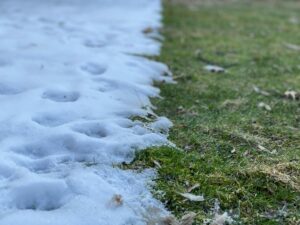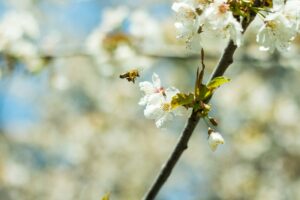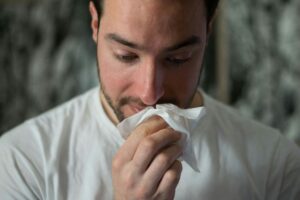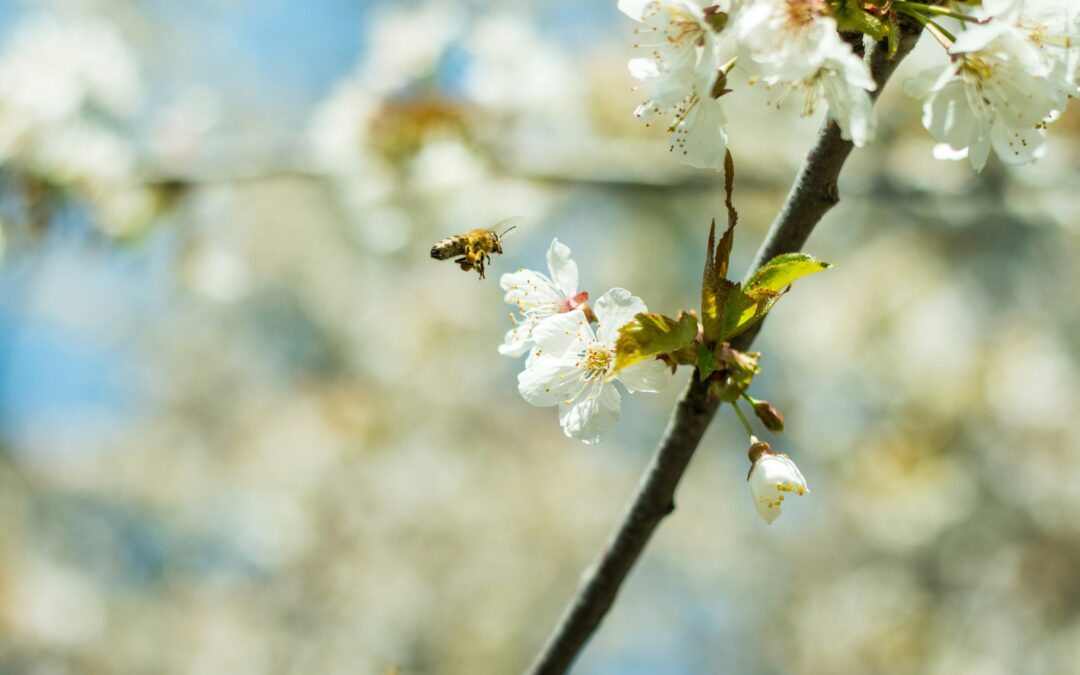As the snow begins to melt and the days grow longer, many of us welcome spring with open arms. However, for allergy sufferers, this seasonal shift often brings a wave of symptoms—from sneezing and nasal congestion to itchy eyes and fatigue. What most people don’t realize is that two major allergy triggers overlap during this transitional time: snow mold and tree pollen.
Understanding how these allergens affect your body—and how to manage them naturally—can help you embrace the season with energy, clarity, and a healthy immune system.

What Is Snow Mold, and Why Should You Care?
When snow melts away, it creates a damp environment—perfect for fungal growth. Snow mold is a type of fungus (most commonly gray snow mold and pink snow mold) that grows underneath the snow during winter and becomes airborne in early spring as the ground begins to dry. You don’t have to be a gardener or spend hours outside to be affected; microscopic spores become airborne and can irritate the respiratory system, especially in those with mold sensitivities or asthma.
Common symptoms of snow mold allergies:
-
Runny or stuffy nose
-
Sneezing
-
Coughing
-
Itchy throat or eyes
-
Sinus pressure or headaches
-
Fatigue or “brain fog”
Enter: Tree Pollen Season
Right after snow mold kicks in, tree pollen season begins. Trees such as birch, oak, maple, and elm release fine pollen grains into the air as part of their reproduction cycle. Moreover, these allergens can travel for miles on a windy spring day, and they’re small enough to get deep into the respiratory tract—causing both upper and lower respiratory symptoms.
People often blame colds or viruses for their symptoms, but if your sniffles linger more than 10 days or seem to come back every spring, seasonal allergies could be the culprit.
The Perfect Storm: Snow Mold + Tree Pollen
In places like Calgary, Alberta—or anywhere with a long winter and sudden spring thaw—the combo of snow mold and early tree pollen creates a double-whammy effect on your immune system. Additionally, this transition puts your body on high alert, potentially overloading your histamine response and leaving you feeling depleted and foggy just as you’re ready to enjoy the outdoors.
Holistic Solutions to Support Your Body This Season
Whether you’re sensitive to one or both triggers, there are powerful naturopathic and wellness-based strategies to help you reduce symptoms, support your immune system, and thrive during spring. Here’s what we recommend:

1. Clear Out Allergens Naturally
-
Spring Cleaning: Dust, mold spores, and pollen can collect inside your home. Accordingly, vacuum with a HEPA filter, wipe down surfaces, and wash bedding regularly.
-
Nasal Rinsing: Use a saline rinse or neti pot to clear allergens from your nasal passages and reduce inflammation.
-
Air Purifiers: HEPA air purifiers in your bedroom can significantly reduce your exposure to airborne allergens.
2. Support Your Immune System With Food
Your body’s ability to process and eliminate allergens efficiently depends heavily on gut and liver health. Thus, try incorporating these immune-friendly foods:
-
Turmeric & Ginger: Natural anti-inflammatories that can calm allergy symptoms.
-
Leafy Greens (like kale and spinach): Rich in antioxidants and chlorophyll for detox support.
-
Omega-3s (from flaxseeds, chia seeds, or salmon): Reduce inflammation and strengthen the immune system.
-
Fermented foods: Kefir, coconut yogurt, sauerkraut—these help keep your gut microbiome balanced and resilient.
-
Local honey (if tolerated): Some people report reduced pollen sensitivity over time by consuming raw, local honey.
3. Herbal and Nutritional Support
Several herbs and supplements can naturally reduce histamine levels and support detox pathways:
-
Quercetin: A natural antihistamine found in apples, onions, and supplements.
-
Nettle Leaf: Traditionally used to treat seasonal allergies—try it as a tea or in capsules.
-
Vitamin C: Helps break down histamine and supports the immune system.
-
Probiotics: A balanced gut means a balanced immune response.
-
Butterbur: Some research shows it can relieve allergy symptoms similarly to over-the-counter antihistamines.
Always consult your naturopath or healthcare provider before starting new supplements. Furthermore, if you’re on medication or managing a chronic condition.
4. NAET and Allergy Desensitization
If you’re looking for long-term relief, treatments like NAET (Nambudripad’s Allergy Elimination Techniques) offer an alternative approach to managing environmental allergies. Significantly, NAET uses a blend of kinesiology, acupuncture, and nutrition to identify and reprogram the body’s response to allergens.
Whereas, addressing allergies at the energetic level, many clients find lasting relief without relying on antihistamines or decongestants. Evidently, it’s helpful for individuals who experience overlapping symptoms or multiple environmental triggers.

5. Massage & Detox Therapies for Immune Support
Spring is also a wonderful time for detox massage or lymphatic drainage, which helps the body eliminate waste and allergens more efficiently. Specifically, these therapies:
-
Reduce inflammation
-
Boost circulation
-
Support the lymphatic system
-
Promote relaxation (a stressed body = a reactive body!)
At our clinic, we offer seasonal wellness packages that include detox massage, NAET treatments, and immune support consults tailored to this unique time of year.
6. Stay Hydrated and Rested
Water helps flush allergens from your system and keeps mucous membranes healthy. Your goal should be 2-3 liters per day, especially if you’re experiencing congestion or dry throat.
Don’t underestimate the power of rest—your immune system does most of its repair work while you sleep. Aim for 7–9 hours per night, and reduce screen time before bed to support melatonin production and deep sleep.
7. Mind-Body Support for Seasonal Allergies
Stress can worsen allergy symptoms by triggering the release of cortisol and histamine. Surprisingly, try to incorporate gentle mind-body practices such as:
-
Yoga or stretching
-
Breathwork and mindfulness meditation
-
Outdoor walks in low-pollen times (early morning or after rain)
By reducing stress and increasing oxygen flow, these habits help calm the nervous system and promote a healthier histamine response.
Final Thoughts: Spring Can Be Joyful Again
You don’t have to suffer through another spring with a tissue box in hand. Undoubtedly, understanding your body’s seasonal sensitivities—and supporting your immune system holistically—can make all the difference.
Have you been struggling with persistent sinus congestion, fatigue, or brain fog every spring? Then this may be the year to take a more proactive, natural approach. Our clinic is here to support you with:
✅ Personalized Naturopathic Consultations
✅ NAET Allergy Desensitization
✅ Seasonal Detox Massage
✅ Targeted Immune Support Programs
Ready to Breathe Easier This Spring?
We highly recommend to try our Immune Enhancer IV or Allergy Support Shot
Click here to book now or call us at 403.452.6262 to learn more.

